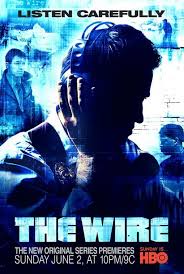The Wire (2002 - 2008)
The Wire is an American crime procedural television series produced and written mainly by the creator and former police reporter David Simon. Set up and created in Baltimore, Maryland, The Wire presents a new city agency and its connection to law enforcement in each season, while maintaining characters and progressing plots from previous seasons. The five issues are in chronological order: the illicit drug trade, the maritime port infrastructure, the city administration and the bureaucracy, schooling and schools, and the print media.[1]
About The Wire
Creator David Simon has served as a Baltimore reporter for two decades since developing The Wire, and he knows the problems well. The show questions common wisdom about white privilege, sexuality, the prison industrial complex, the collapse of the drug war, and a host of issues that American cities face today. It's an unflinching opponent of the American dream, and who's going to live it. It is intended to drive affluent viewers towards a greater understanding of those whose lives are ignored in America. In brief, The Wire raises "big questions" that we want college students to care about.
Black Empowerment
The Wire, unlike many TV shows, is full of storylines that aim to intervene on societal issues, including policing and racism. His stories echo with today's America-especially police and racism-even though his last episode aired in 2008. In particular, NPR's Eric Deggans recently claimed that Wire is more important now than it was when it aired, "because so many of its messages about urban failure, policing, and race" is still a reality.
The Wire is motivated by a journalistic desire to expose many of the aspects of metropolitan America that remain inaccessible to many white Americans. More open-minded and dynamic plot constructs of The Wire episodes make it easier to analyze the social context. The Wire, which followed a team investigating drug-related offences, gave insights into the institutional weakness of the "war on drugs" It also brought a layer to characters that would usually be stigmatized as "gangsters" by providing insight to their inner lives and addressing the social conditions that create violence.
We continue to exist in what Simon called "two Americas"—one linked to and the other cut off from its abundance and hope, and racial differences are vividly clear today. In this way, the shootings of Black people by the police are not "news," but just more evidence that Black Americans are dying of "slow deaths." Real-life police officers who kill unarmed Black men today are the Carvers and Hercs of the Baltimore PD in the show, wrapped up in a system of paranoia, machismo and careerism, where "busting heads" and making more arrests are creating values. The show serves as an indictment of America's broken pledge of freedom, a sign that American cities and the people who live in them-are dying painfully due to institutional indifference. [2]
Mainstream awards such as the Golden Globes and Emmys have historically refused to consider programs like The Wire, ignoring shows with culturally balanced or majority Black casts. [3]
Critics
There is also a critic made by Hollywood reporter, Inkoo Kang about how she viewed almost every depiction of the police on TV right now rankles, including one that was appreciated for its accurate portrayal of brutality and violence by power. She wrote, “In the first season of The Wire, just about every on-the-ground cop participates in police brutality — often as a kind of professional prerogative. Their violence is meant to add darker streaks to the characters’ otherwise heroic gloss, but it also has the effect of normalizing police brutality as a part, even a perk, of the job.”
However, The Wire actor Wendell Pierce responded to the critics, by saying, “How does anyone watch "The Wire" and the police dysfunction and drug war and say that we were presented as heroic? We have seen moral complexity and the pathology that contributes to violations. The Wire, if anything, was the canary-in-the-mine that forecast the institutional moral morass of politics and policing that led us to the protests of today.“[4]
Reference
- ↑ The Wire. Wikipedia. Retrieved Feb 1, 2021.
- ↑ Achter, Paul. White people get "The Wire" all wrong: Its lessons on race and racism must be absorbed. Jul 21, 2015. salon.com. Retrieved Feb 1, 2021.
- ↑ Jenner, Mareike. How cop shows serve to reinforce the racism at the heart of our culture. Jul 24, 2020. theconversation.com. Retrieved Feb 1, 2021.
- ↑ William, Michael K.. Revisiting The Wire During 2020’s Black Lives Matter Movement. Jun 12, 2020. openculture.com. Retrieved Feb 1, 2021.
